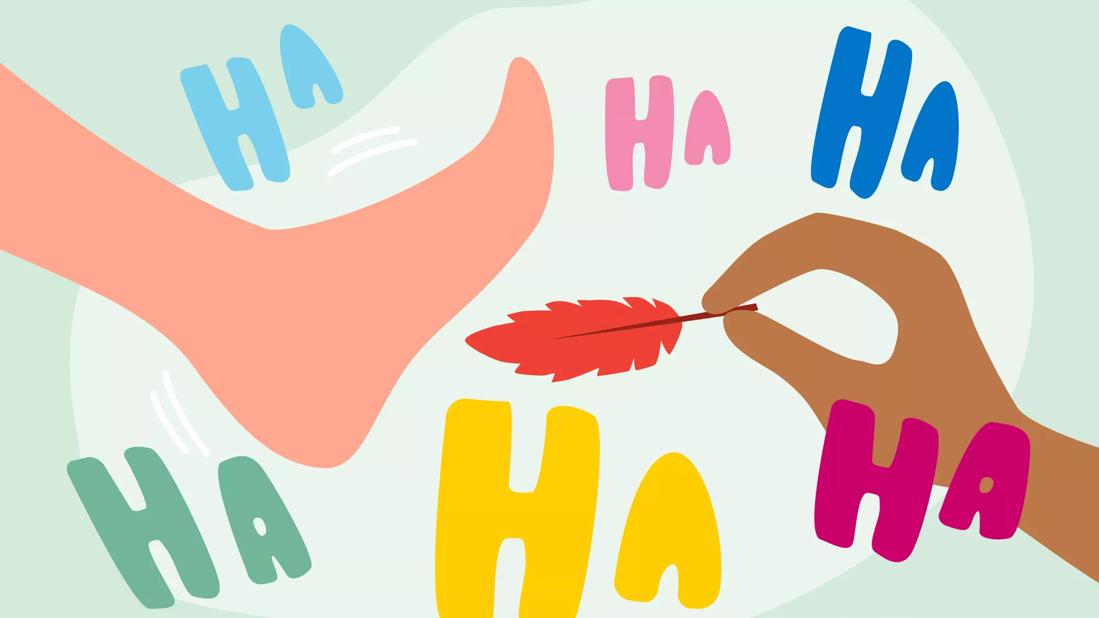The tickling response may be more about protection than enjoyment

Image content: This image is available to view online.
View image online (https://assets.clevelandclinic.org/transform/0f0dd613-0ebc-437c-bcd9-87f643f60eb1/ticklish-1881356632)
Foot being tickled by a feather, with laughter floating around
If you stop and think about it, being tickled is kind of weird, right? It’s not necessarily pleasant, but you can’t seem to stop laughing either.
Advertisement
Cleveland Clinic is a non-profit academic medical center. Advertising on our site helps support our mission. We do not endorse non-Cleveland Clinic products or services. Policy
What’s going on there?!
Your body’s tickle response is surprisingly complex and somewhat mysterious, says family medicine physician Neha Vyas, MD, though a few researchers have attempted to understand it. She explains the science behind ticklishness, including the two different types of tickling and what your brain thinks is happening when you’re being tickled.
Being tickled stimulates activity in a small area of your brain called the hypothalamus, which sits directly above the brainstem at the base of your brain. Though it’s only about the size of an almond, your hypothalamus has a big role to play: It’s in charge of emotions and your body’s reaction to danger and stressful situations, known as the fight-or-flight response.
“Your hypothalamus controls that adrenaline rush you get when something abrupt, exciting or challenging happens to you,” Dr. Vyas explains, “so it’s geared toward protecting you.”
Your hypothalamus goes on high alert when it thinks you’re in danger or facing some sort of threat, which may explain why tickling tender places tends to trigger the strongest reactions. It may also explain why you can’t really tickle yourself: Your brain doesn’t register your own hands as an external threat!
Advertisement
Why laughter, though? It certainly seems like a strange response to a perceived threat. Researchers aren’t sure why our bodies produce this particular response (though they continue to study it). But it turns out we’re not the only ones.
“Animals in the gorilla family seem to have some of the same typical responses to tickling that we do,” Dr. Vyas notes.
The most ticklish spots tend to be those that are also the most sensitive, like your:
Plus, not all tickling is created equal. There are actually two different types of tickling, and they even have scientific names:
No, not everyone is ticklish. The tickle response varies from person to person. Some people are so ticklish that the sight of approaching wiggly fingers can set them squirming. But others barely react.
Factors that affect your degree of ticklishness include:
Yes, kids are typically more ticklish than adults, but there’s no solid research to explain why. Dr. Vyas says that as you age, your reduction in ticklishness may be due to changes in nerve function and sensitivity.
It could also be that children often see tickling as a fun, playful interaction, while adults find it to be more invasive and less enjoyable. (As a reminder, everyone, including children, has the right to bodily autonomy. Don’t tickle anyone who doesn’t consent to being tickled!)
If you’ve ever heard the phrase “tickle torture,” you might think it’s just a cute way to describe a tickle session. But it’s a real thing. Extreme, nonstop tickling can lead to hypoxia, which means not enough oxygen is getting to your brain.
Advertisement
“Tickling has, in fact, been used as a torture device,” Dr. Vyas confirms, “and people have actually been tickled to death.”
Even when tickling isn’t quite so barbaric, many people don’t find it enjoyable. This may have to do with how your nerves perceive the sensation of tickling. Scientists discovered that tickling stimulates the nerves that signal pain. That pain signal, combined with triggering your fight-or-flight response, can make tickling downright uncomfortable.
But, again, what about the laughter? Research suggests that it may be a reflex, not a sign of enjoyment.
“Tickling is not necessarily fun for everyone,” Dr. Vyas reinforces. “In some people, being tickled can even lead to panic attacks.”
So, don’t let laughter fool you into thinking tickling is a happy experience for the tickle recipient. Always be sure to be gentle, respect their boundaries and stop to let them catch their breath.
Advertisement

Sign up for our Health Essentials emails for expert guidance on nutrition, fitness, sleep, skin care and more.
Learn more about our editorial process.
Advertisement
Physical activity can help preserve and improve your cognitive function and fend off dementia, stroke and other health concerns
The ‘Six Pillars of Brain Health’ offers a game plan to maintain cognitive function
You can build mental muscle by challenging your mind and giving it new experiences
This first-of-its-kind study aims to identify biomarkers of neurological disorders
Different parts are responsible for different things, but you use both sides all the time
Add some brain food to your plate
A collection of fascinating facts
Give your brain the break it needs
Although it could be used as a moisturizer, this new trend is not recommended
Communicating clear limits helps protect your time, energy and emotional well-being
High cholesterol can be genetic, but testing and treatment can lower your heart disease risk